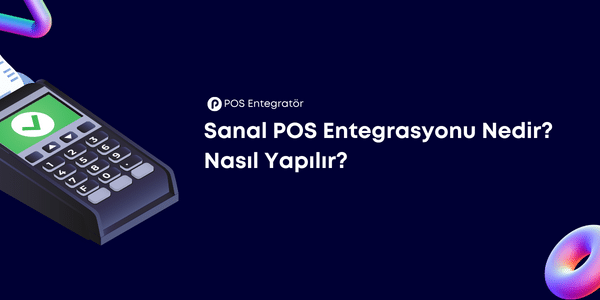What is Virtual POS Integration? How is it done?

Table of Contents
What is Virtual POS Integration? How is it done?
Virtual POS integration is an issue that has gained importance with the spread of online commerce. This integration enables businesses to perform secure and fast payment transactions through online sales platforms. In this article, we will examine in detail what Virtual POS integration is and how to do it.
What is Virtual POS?
Sanal POS (Point of Sale) means Point of Sale in Turkish. However, when used in online commerce, it refers to payment transactions made over the internet rather than a physical point. Virtual POS is a tool that transmits customers' payments to online shopping sites through credit cards or other online payment methods.
Customers will enter their card information on the payment screen at the checkout stage. This information includes the name, card number, expiration date and CVV number on the back of the card. After confirmation, the payment process is completed. Virtual POS can be considered as the online version of card payment systems in physical stores.
Generally, every bank offers online POS service. In order to receive online POS service, it is necessary to apply to the relevant bank. When applying for Virtual POS, the documents requested vary according to the type of company. Applications can be made to banks with documents such as tax certificate, copy of identity card, signature circular, copy of trade registry newspaper.
In order to obtain Virtual POS approval, banks look for certain features in online business sites. These features include the site being secure, having procedures such as a distance sales contract and return-cancellation information. It is also important that the products to be offered for online sale and their prices are specified on the e-commerce site.
Why Virtual POS Integration is Necessary?
Virtual POS integration enables online businesses to manage payment transactions more effectively and securely. In addition to enhancing the customer experience, this integration makes payment processing faster and smoother. It also plays an important role in payment security.
How to Integrate Virtual POS?
When we consider the steps for Virtual POS integration, e-commerce sites need to meet certain criteria. Here are the features sought in this process:
Initially, it is important that your site has an SSL certificate. An SSL certificate ensures that customer information is transmitted securely and this increases the security of payment transactions.
Next, your e-commerce site's products need to be uploaded and priced. Product information presented to customers in a clear and understandable way positively affects the shopping experience.
The security of the site is a critical factor for it to receive virtual POS service. For this reason, it is important to include procedures such as distance sales contract, return and cancellation information on your site. Providing transparent and clear information to customers on these issues contributes to increased trust.
It is also of great importance that the documents submitted when applying for virtual POS integration are complete. Banks usually request documents such as tax certificate, copy of identity card, signature circular, copy of trade registry newspaper. Submitting these documents completely and accurately helps the integration process to proceed quickly and smoothly.
As a result, in order to take a successful step for virtual POS integration, it is very important that the technical infrastructure of your site is up-to-date, product information is organized and complete, security is prioritized and the necessary documents are completed.
Virtual POS Setup Steps
- Contacting the Bank:
- The first step is to contact the bank to which your business is affiliated. Your bank can provide you with virtual POS service and start the application process. For virtual POS and payment institutions supported by POS Integrator click here.
- Virtual POS Application:
- You will need to fill in the application form provided by your bank/payment institution. This form usually includes your business details, tax number and trade register.
- Preparation of Documents:
- The bank may ask for documents such as identity documents, tax certificates and trade registry records. You can complete your application by preparing these documents.
- Integration Provider Selection:
- Virtual POS integration you will need to choose an integration provider. These companies allow you to integrate the payment system into your site.
- Integration Process:
- In cooperation with the integration provider of your choice, you can integrate Virtual POS on your site. This can usually be completed in a few steps.
- Testing and Safety Check:
- Once the integration is complete, it is important to test the payment processing. You should also check the necessary security measures for the safety of customer information.
Banks and Organizations Providing Virtual POS
Banks that give virtual pos are quite diverse. Among these; Yapı Kredi, Garanti BankAkbank, İşbank, Finansbank Teb, Denizbank, Halkbank, Türkiye Finans Bank.
Advantages and Challenges of Integration
Advantages of Virtual POS Integration
- Fast and secure payment processing
- Increase in customer satisfaction
- Efficiency in business processes
Challenges of Virtual POS Integration
- Technical challenges and compliance issues
- Security concerns
- Payment service provider selection
Virtual POS Integration is Important and Viable
Virtual POS integration is an essential element for online businesses. Choosing the right payment service provider, using the right API and taking security measures are key to making your business' online payment processes more effective. By following these steps correctly, you can offer your customers a reliable and seamless shopping experience.












